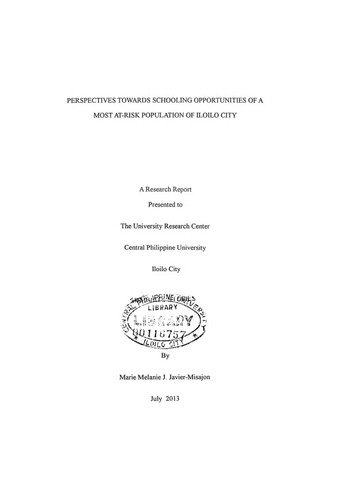Perspectives towards schooling opportunities of a most at-risk population of Iloilo City
| dc.contributor.author | Javier, Marie Melanie J. | |
| dc.coverage.spatial | Iloilo | en_US |
| dc.date.accessioned | 2021-05-28T01:56:11Z | |
| dc.date.available | 2021-05-28T01:56:11Z | |
| dc.date.issued | 2013-07 | |
| dc.identifier.citation | Javier, M. M. J. (2013). Perspectives towards schooling opportunities of a most at-risk population of Iloilo City (Research report). Jaro, Iloilo City: University Research Center, Central Philippine University. | en_US |
| dc.identifier.uri | https://hdl.handle.net/20.500.12852/914 | |
| dc.description | Abstract only | en_US |
| dc.description.abstract | This study investigated several demographic features of a Most At-Risk Population (MARP) of Iloilo City, specifically, Commercial Sex Workers (CSWs). It also investigated their residency status, vocational training history and views regarding the opportunity for schooling for an alternative livelihood. It also aimed to determine the selection criteria for those who would participate in this schooling. A take-all sample of all registered CSWs with the Social Hygiene Clinic of Iloilo City was taken. The population included 131 respondents who work as masseuses, Guest Relations Officers (GRO) and dancers in the city. Frequency distribution was used to describe data, while Chi square, Phi and Cramers V were used to determine association between nominal variables. Regression analysis was used to predict length of time the respondents were willing to commit given two interlaying variables. The survey shows that the registered CSWs of Iloilo City are mostly females, single and in their prime years (21-29 years old). They are sufficiently educated, mostly being high school graduates and college undergraduates. Many of them have one child. They are mostly transients coming from different parts of the Philippines but mostly from Negros Occidental, Cebu and Manila. Their work areas are in JM Basa St., scattered in the Molo area and Delgado St. While majority have not undergone vocational training, a close number have undergone training mostly in massage therapy at TESDA. The CSWs welcome the opportunity for a different livelihood to better help their families and gain community respectability. They are willing to a accept a scholarship and would like to study Culinary Arts for a short time but mostly willing to complete the four years required of a college degree. They will stop schooling if they will encounter financial difficulties, generally speaking. Others do not like to study because this will mean loss of income as breadwinners. The critical selection criteria for potential scholarship grantees are age, civil status, number of children, and educational level. | en_US |
| dc.format.extent | viii, 63 leaves | en_US |
| dc.language.iso | en | en_US |
| dc.publisher | Central Philippine University | en_US |
| dc.rights | Attribution-NonCommercial-NoDerivs 3.0 Philippines | * |
| dc.rights.uri | http://creativecommons.org/licenses/by-nc-nd/3.0/ph/ | * |
| dc.subject.ddc | GSL 301.72 M68 | en_US |
| dc.subject.lcsh | Sex workers | en_US |
| dc.subject.lcsh | Prostitution | en_US |
| dc.subject.lcsh | Masseurs | en_US |
| dc.subject.lcsh | Vocational guidance | en_US |
| dc.subject.lcsh | Vocational education | en_US |
| dc.subject.lcsh | Philippines--Iloilo | en_US |
| dc.title | Perspectives towards schooling opportunities of a most at-risk population of Iloilo City | en_US |
| dc.type | Technical Report | en_US |
| dcterms.accessRights | Limited public access | en_US |
| dc.description.bibliographicalreferences | Includes bibliographical references | en_US |
| local.relation.associatedcontent | https://repository.cpu.edu.ph/handle/20.500.12852/648 Full paper published in Patubas | en_US |
Files in this item
This item appears in the following Collection(s)
-
Research reports [42]
-
Research reports [167]



